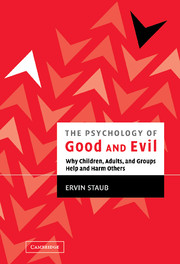Book contents
- Frontmatter
- Contents
- Preface
- Acknowledgments
- PART I INTRODUCTION AND CORE CONCEPTS
- PART II THE ROOTS OF HELPING OTHER PEOPLE IN NEED IN CONTRAST TO PASSIVITY
- PART III HOW CHILDREN BECOME CARING AND HELPFUL RATHER THAN HOSTILE AND AGGRESSIVE
- PART IV THE ORIGINS OF GENOCIDE, MASS KILLING, AND OTHER COLLECTIVE VIOLENCE
- PART V THE AFTERMATH OF MASS VIOLENCE: TRAUMA, HEALING, PREVENTION, AND RECONCILIATION
- PART VI CREATING CARING, MORALLY INCLUSIVE, PEACEFUL SOCIETIES
- 44 Changing Cultures and Society
- 45 Transforming the Bystanders: Altruism, Caring, and Social Responsibility
- 46 Blind versus Constructive Patriotism: Moving from Embeddedness in the Group to Critical Loyalty and Action
- 47 Manifestations of Blind and Constructive Patriotism: Summary of Findings
- 48 The Ideal University in the Real World
- 49 Conclusion: Creating Caring Societies
- Appendix: What Are Your Values and Goals?
- Index
47 - Manifestations of Blind and Constructive Patriotism: Summary of Findings
Published online by Cambridge University Press: 07 May 2010
- Frontmatter
- Contents
- Preface
- Acknowledgments
- PART I INTRODUCTION AND CORE CONCEPTS
- PART II THE ROOTS OF HELPING OTHER PEOPLE IN NEED IN CONTRAST TO PASSIVITY
- PART III HOW CHILDREN BECOME CARING AND HELPFUL RATHER THAN HOSTILE AND AGGRESSIVE
- PART IV THE ORIGINS OF GENOCIDE, MASS KILLING, AND OTHER COLLECTIVE VIOLENCE
- PART V THE AFTERMATH OF MASS VIOLENCE: TRAUMA, HEALING, PREVENTION, AND RECONCILIATION
- PART VI CREATING CARING, MORALLY INCLUSIVE, PEACEFUL SOCIETIES
- 44 Changing Cultures and Society
- 45 Transforming the Bystanders: Altruism, Caring, and Social Responsibility
- 46 Blind versus Constructive Patriotism: Moving from Embeddedness in the Group to Critical Loyalty and Action
- 47 Manifestations of Blind and Constructive Patriotism: Summary of Findings
- 48 The Ideal University in the Real World
- 49 Conclusion: Creating Caring Societies
- Appendix: What Are Your Values and Goals?
- Index
Summary
I have proposed the existence of two types of patriotism: blind and constructive. Blind patriotism is an attachment to country that is characterized by unquestioning acceptance of its policies and practices and unquestioning allegiance. It is expressed in agreement with questions like “I would support my country right or wrong”; “People should not constantly try to change the way things are in America”; and “It is un-American to criticize this country.” Constructive patriotism combines attachment, love of country, with the capacity and willingness to question, criticize, and work for change. It is expressed in agreement with questions like “My love of country demands that I speak out against popular but potentially destructive policies”; “People should work hard to move this country in a positive direction”; and “If you love America, you should notice its problems and work to correct them.” Constructive patriots say, in essence, because I love my country I have to question problematic policies and practices. This study considers the manifestations of these two kinds of patriotism in attitudes and behaviors toward one's own country and toward other countries.
The participants were undergraduate students at the University of Massachusetts at Amherst. They completed a questionnaire that intended to assess types of patriotism. The results showed that constructive patriotism was positively related to scores on a measure of prosocial value orientation, understood here to assess positive valuation of human beings and a feeling of personal and social responsibility for others' welfare.
- Type
- Chapter
- Information
- The Psychology of Good and EvilWhy Children, Adults, and Groups Help and Harm Others, pp. 513 - 515Publisher: Cambridge University PressPrint publication year: 2003
- 1
- Cited by



